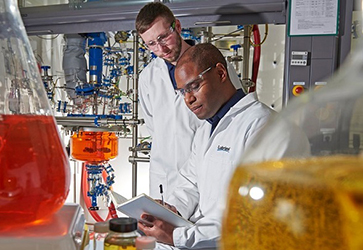Warwick research and Lubrizol
Coming together to spark a reaction: How Warwick research could help Lubrizol reduce its carbon footprint

In an exciting research programme, Professor David Haddleton’s team is working with industry and academic partners to help decarbonise the chemical industry.
Unless you work in it, you probably don’t think about the chemical industry all that often.
But almost everything we use every day, from personal care products to clothes and fuel additives to hand sanitisers, contains some level of chemical industry content.
The industry’s reach is everywhere.
And now, it’s facing a huge challenge: getting greener – fast.
To that end, US-based company Lubrizol partnered with the University of Warwick and the University of Nottingham in 2021 to create a groundbreaking programme of research.
Partners for the long term
The new programme, dubbed Sustainable Chemicals Innovations Enabling Net Carbon Emissions, or SCIENCE for short, has been made possible by a Prosperity Partnership funded jointly by the Engineering and Physical Sciences Research Council and Lubrizol.
SCIENCE’s aim is to make the manufacture of speciality chemicals more environmentally sustainable – and ultimately help reach the UK’s net zero target of decarbonising all sectors of the economy by 2050.
Lubrizol, a subsidiary of Berkshire Hathaway that employs nearly 9,000 people worldwide, has enjoyed a long and fruitful relationship with Warwick.
Professor David Haddleton from the Department of Chemistry at Warwick has worked with the firm on projects for many years; as long ago as 2010, his team created self-healing polymers that could extend the lifetime of automotive oils in a project in which Lubrizol was the industrial collaborator.
In fact, the partnership even provided a helping hand during the pandemic, when Lubrizol donated a thickening agent that Warwick research students used to make 4,000 litres of hand sanitiser ahead of the University’s full reopening after lockdown.
The hope is that extending this relationship through SCIENCE will open up new opportunities to create cleaner, greener chemical processing methods for everyday products.
“With chemistry at the heart of most products it is estimated that over 96% of all manufactured goods have chemical industry content,” Mark Davies, Senior Director of Research and Development at Lubrizol, said.
“That makes the industry a major contributor to the UK economy – and a key facilitator of change through innovation.
“Developing new sustainable ways to make our additives with Warwick and Nottingham will ultimately lead us to lowering our environmental footprint, and will also help the manufacturers we supply have some clarity in their supply chain of chemicals.”
Innovating directly with industry
Science researchers are now using the latest sustainable chemistry techniques to develop a toolkit with the power to transform all aspects of additive synthesis from initial discovery through to the chemical manufacturing of high-value molecules.
The work is designed to tackle a series of business-led research challenges such as ‘designing smarter molecules’, ‘using better chemistries’ and ‘energy resilient processes’, all of which will help reduce the amount of chemicals, solvents and processing steps needed to manufacturer complex molecules and polymers.
“In order to make complex and essential molecules and polymers in a sustainable way, we need to go back to basics to ensure we become carbon neutral by exploiting atom-efficient catalysis and renewable resources,” Professor Haddleton explained.
“The companies we work with, including the likes of Lubrizol, come to us with their problems because not only do we have probably the best set of equipment for analysing polymers in Europe, but also because we can help them understand what’s happening with expertise they just don’t have internally.”
For Lubrizol, developing more environmentally friendly manufacturing methods could have a huge impact on the company’s carbon footprint – while also making its products far more attractive to eco-conscious consumers and brands alike.
David, his team at Warwick and his partners on the programme in Nottingham share Lubrizol’s drive to innovate new processes.
“Sustainability is the big thing I’m passionate about in my work,” he said.
“Polymers are everywhere – in your mobile phone, your clothes, toiletries in your bathroom – so what I think we need to do is to provide materials that perform a lot better and are sustainable, while not costing very much more.”
